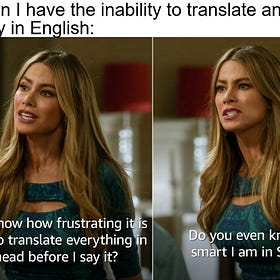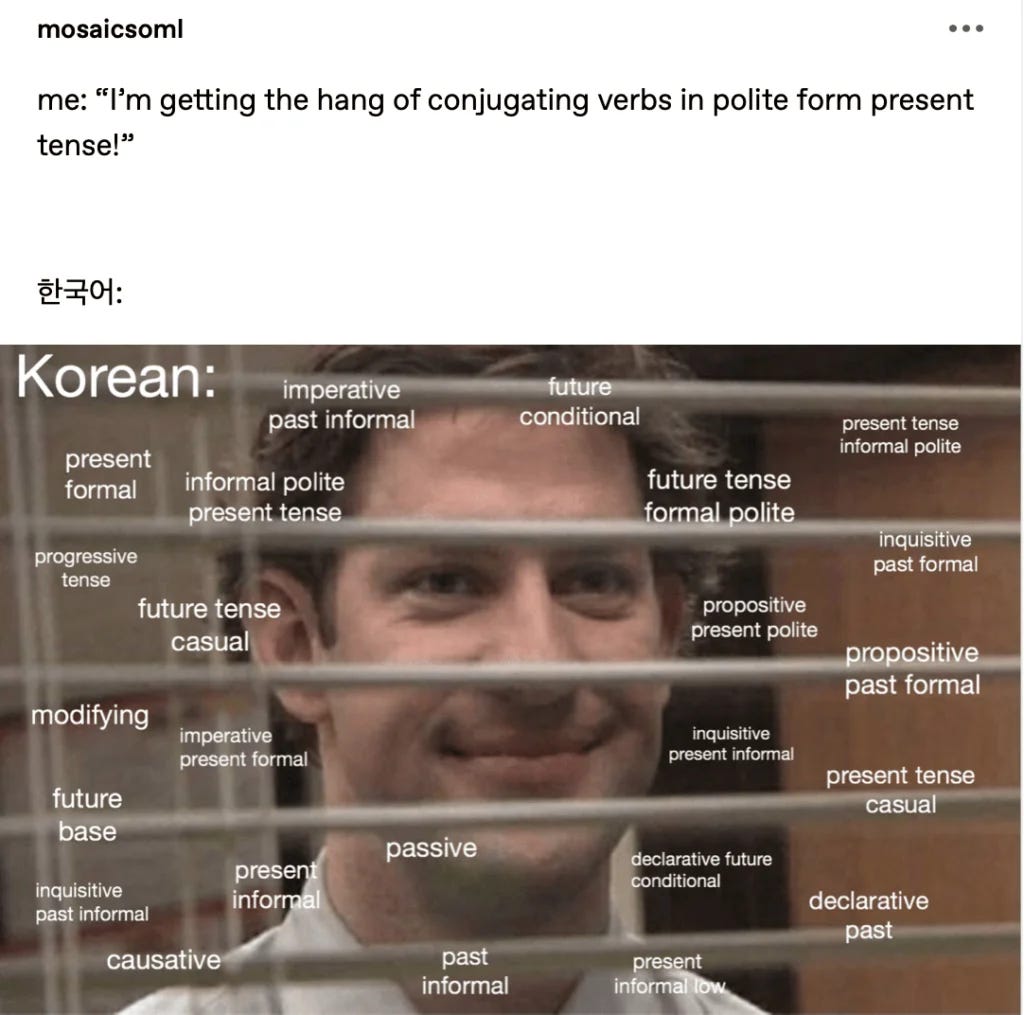Things You NEED to AVOID During Second Language Acquisition
Develop your language skills without wasting your time
Welcome, aspiring polyglot! Much of the focus here is on all of the things you can and probably should do when you are learning a new language. There is, however, plenty of information out there that is simply wrong. Things that will lead people to working on their target language for years rather than months before they even attempt to speak it aloud.
While learning foreign languages is by no means an easy feat, there is also no reason for it to take years and years. For that reason, in this post we are going to work through some of the things you should not be doing during your second language acquisition. This is by no means a comprehensive list, but it is a great starting point to ensure you are not spending time spinning your wheels without making any meaningful progress.
Stop memorizing new vocabulary words out of context
Recently we have been discussing why getting to a conversational level in your target language is so important. If you missed that, be sure to check it out here:
Why "Conversational" is the Perfect Second Language Goal
Welcome, aspiring polyglot! This week I began lessons with a new student who is learning English as a second language. A Polish man looking for a career change who wants to ensure his English language skills will not hinder him during his job search.
Something that was not as focused on during that discussion, however, is why it is so important to learn words in context. Memorizing and regurgitating words is great if you are trying to pass a test, but if you want them to remain useful to you in your long term memory you need to be learning and using all of your new vocabulary words in context.
When you have a frame of reference from which to pull, you are far more likely to recall something you have only just begun to understand. Whereas if you are just memorizing words out of a book you have only that one place to pull them from and that rarely will suffice. Speaking and reading and writing, seeing how all of the words interact with one another and how you can use them to express different things in your new language is key to the development of your second language skills.
After taking some time to understand how the new words you are learning interact with one another, it's time to take on verbs. While you should also be learning to use verbs in sentences, you should never stop with the infinitive form of the verb. Try to add in at least two verb tense conjugations for every verb you learn. Even if it is only present and basic past tense, it is better than only knowing the infinitive form.
With these conjugations you can build sentence frames to plug and play with all of your new vocabulary words. Additionally, you will not be isolated in the present tense, you will be able to immediately start telling stories using the past tense.
Eventually you will want to work into the future, but there is a cheat code for that called the "near future" tense in many languages that will allow you to express future actions without learning an entirely new conjugation for all of the verbs in your repertoire. Check out this article for tips on how to use the near future in your new language:
Becoming Bilingual
Welcome, budding polyglot! One of the most interesting aspects of learning a new language is realizing how little people know, generally speaking, about their own native language. This is something you will experience, if you haven't already. However, it is not a bad thing for you to recognize! It is far worse, in fact, to go on without recognizing this…
Whenever possible, avoid looking up words on your phone or on a computer. Looking up words in a physical dictionary and taking the time to write them down will not only increase your language output, it will also facilitate the learning process in the medium to long term.
There is a reason you never see technology in your dreams, even if you use a computer or phone for eight hours every day. It takes far more time than a simple Google search, but the return on your time is ten fold. You need the extra memory encoding to ensure you are able to recall the things you are learning.
Avoid these mistakes when learning about grammar structures
Rather than asking yourself what grammar you can learn you should be asking yourself what grammar you would use. With how much there is to learn in any given language, it can be easy to get bogged down in efficiency from comprehensible input to language instruction.
If you are trying to be the most efficient, you should not be focused entirely on learning every word in a foreign language. Instead you should be focused on learning the words you use, irrespective of your purported second language level.
Most people find they use the conditional tense more often than they think when they are translating their own words. That is because the conditional is useful for a myriad of reasons and is almost second nature for a native speaker. For that reason you should not wait to learn it in other languages. Mainstream classrooms have a horrible habit of teaching two or three verb tenses over the course of years, but there are often ten or more in different languages.
Sticking with one or two will limit your ability to express yourself which can feel debilitating in a learning environment or when speaking with native speakers. Working on these things will also improve your listening skills as you will have a greater understanding of conjugation patterns that can be applied to almost every verb. There are irregulars in almost every foreign language, but they are called irregular for a reason. You can work on those independently while focusing on the overarching pattern.
Do not sweat the small stuff in your new language
Escaping the silent period is going to mean you cannot sweat the small stuff. Many concepts can be learned in real time, before they are mastered and that is integral in transitioning to a conversational phase. With regards to romance languages specifically, most teachers overemphasize the importance of gendered words, likely because it is easy to create a pass/fail test in mainstream classrooms with regards to gendered words.
In real life situations when speaking with actual native speakers, there is literally no downside to speaking and using the incorrect gender. You may be corrected, or you may not. Most of the time you will be speaking quickly enough that, irrespective of the gender, the article sounds the same.
In German, you will rarely here die, der, or das. Instead you will hear the sound "d" followed by the noun. The same goes for French. You will not hear, le or la, you'll hear "L" followed by the noun. This is just one of the many examples of how spoken language differs from written language.
Stop making the same mistake over and over again
One of the primary reasons I harp so much on things that involve writing is because it is easy to forget the errors you make when speaking. Conversations happen at such a high speed that it can be difficult to go back and remember precisely what you messed up, unless the person with whom you are speaking is willing to correct you. The same cannot be said for written language.
Whether you like it or not, once you write something down you will have a written record of your mistakes. Fortunately, when it comes to second language acquisition, this also means having a written record of all you have accomplished and how far your second language skills have come.
It can be extremely frustrating to consistently mess up the same thing over and over, by writing down your work you can move away from this. Correcting your mistakes in real time and writing in pen so you can see exactly when and where you messed and why it was incorrect will enhance and accelerate your second language acquisition.
Conclusion
There are an unbelievable amount of things you should do when learning a new language and I thought it would be interesting to take a look at all of the things you should not do. Thought this is not a comprehensive list, it is a good start on building a learning environment that is conducive to your success. Focusing on things that matter and achieving some level of fluency in a reasonable time are closely related.
All of the above is easy to recognize in an immersion environment, but mainstream classrooms have changed the perspective of many language learners leading them to commit useless information to their short term memory.
If you truly want to break down the language barrier and start speaking your new language with native speakers, you need to focus on things that move the needle. Memorizing and regurgitating Duolingo lessons will never do that. Avoid the above mistakes and find new ways to get comprehensible input. Your second language acquisition and future self will thank you
As we discuss often around here, creating is vital in second language acquisition. Speaking and practicing with written language will help you in accelerating and enhancing your language learning process, so start having conversations as early on as possible. It will be difficult, but you can do difficult things and be great. So go do some difficult things and become great.
Eager for more Second Language Strategies?
For more content find me on Twitter or Instagram. If you are struggling to get speaking in your target language, get up to 55% off a Babbel subscription using this link. I look forward to seeing everyone’s progress in the months and years to come. Be sure to check out the YouTube channel as well!
Learning Spanish? We have begun aggregating resources in you Spanish Resource Newsletter!
Don't forget to pick up your very own French Language Logbook or Spanish Language Logbook!











